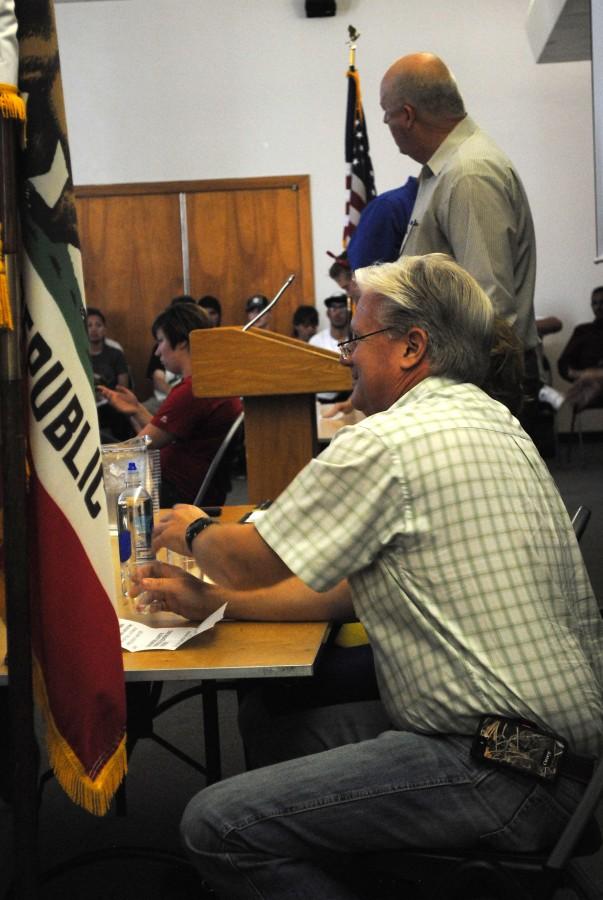The “Rally for Water for the Central Valley,” as flyers read, was set up by the Student Government Association and hosted at Bakersfield College on Sept. 3. The event brought along Kern County elected officials to discuss the California water drought and inform students of how they can ease conditions.
Officials present included Congressman David Valadao, state senators Jean Fuller and Andy Vidak, Assemblywoman Shannon Grove, and Kern County Supervisor David Couch, in addition to local City Councilman Russell Johnson and representatives from the Bakersfield city water department.
“We were discussing the issues facing Kern County and the issue of the state’s drought came up. I thought BC would be the perfect place to hold a water rally. I had the resources, I knew the people to call, I knew it would be a success,” wrote Alex Dominguez, BC’s student president on what sparked the idea for the event.
The rally was split into two sections between the Campus Center area and Fireside Room. The Campus Center’s stage enabled volunteer attendees to speak to the audience members about the drought. BC student Perry Hyatt, a sophomore, took that opportunity to ask others to stop wasting water.
“A pretty, green grass is great, but if our cost of clothing and food is going to skyrocket between now and next year, I’d rather have a dirt field in front of my house,” implored Hyatt. “So, please, if you have that mentality of ‘I pay for it, I’m gonna use it,’ please, please start conserving. Do your part.”
Off stage, he added that he had been motivated to speak after watching the news that morning, which stated that water usage had increased.
During the second part of the rally where elected representatives had their chance to inform, Johnson cleared up the latest reports, like the one Hyatt watched, regarding water usage. “You will hear that the city of Bakersfield used more water this year than last year, and that’s true. But guess what the city of Bakersfield is also doing? We’re growing,” he said.
According to Johnson, the city has acquired an additional thousand meters this time around compared to last year’s report and stated that the water report per meter had in fact decreased by approximately eight percent last month alone.
Eric Avery, who manages a water district primarily on the western edge of Bakersfield, explained that there are two different types of droughts: the lack of precipitation and what he calls, the “self-imposed manmade” drought. The latter happens when a district procures a water supply that is never delivered in full.
Grove had also mentioned that California was in the third year of a five-year drought. She cited a recently-passed environmental protection agency act that now sends previous valley water supply directly to the ocean.
“When you think about it, it’s 1.2 billion acre feet of water just in this past year that has been flushed down to the Pacific Ocean and not brought to us in the valley,” she said. “When you break that down for what it means to the valley, that’s three million homes that would have full water supply and 600,000 acres of farm land.”
“There’s communities not far from here that already don’t have water,” said Johnson, and listed Porterville and the Tulare area as examples of cities already in need of having water trucked to them. “That lets you know that our water system can fail at any time and it’s important to be diligent to understand the issue,” said the councilman. “Water’s going to be an important issue, not only today but 10, 15, 20 years from now. So when you walk out of here you need to remember that making sure we have a sustainable usable water supply for the next lifetime and for the next generation, it takes each and every one of us to make it happen.”
The keynote speaker for the event, Greg Wegis, president of the Kern County Farm Bureau, cited that there are currently 800,000 acres of irrigated land in the county and 12,400 farm jobs that may be affected due to future legislation regarding the water supply.
“Because agriculture has become so efficient, there’s less people directly involved in agriculture. And once you’re not directly involved it’s human nature not to understand it or have the overall education of how important that is,” he said.
The rest of the panel was dedicated to further discussing legislation pieces that has affected water supply for Kern County agriculture.
Couch spoke about the Sustainable Groundwater Manage Act, Grove challenged attendees to call the governor’s office and ask that they tow the environmental protection legislation previously mentioned, Senators Vidak and Fuller pushed the upcoming water bond in November and Congressman Valadao spoke about legislation number 3964, a bill he is working on that addresses the water situation.
“So what do we do about the future?” asked Senator Fuller. “The future is we’re going to have to change the way we use water.”
The remainder of the event was then dedicated to a Q-and-A session.
When asked how SGA felt the Water Rally unfolded, Dominguez responded, “I have only received positive feedback. My Facebook feed was blowing up with pictures of people at the rally. I received various phone calls and text messages thanking me for throwing such [a] beneficial event. Everyone that talked to me said that our community needed this event to happen.”
For more information and advice about the drought, concerned citizens can visit the Water Association of Kern County’s website at wakc.com.


